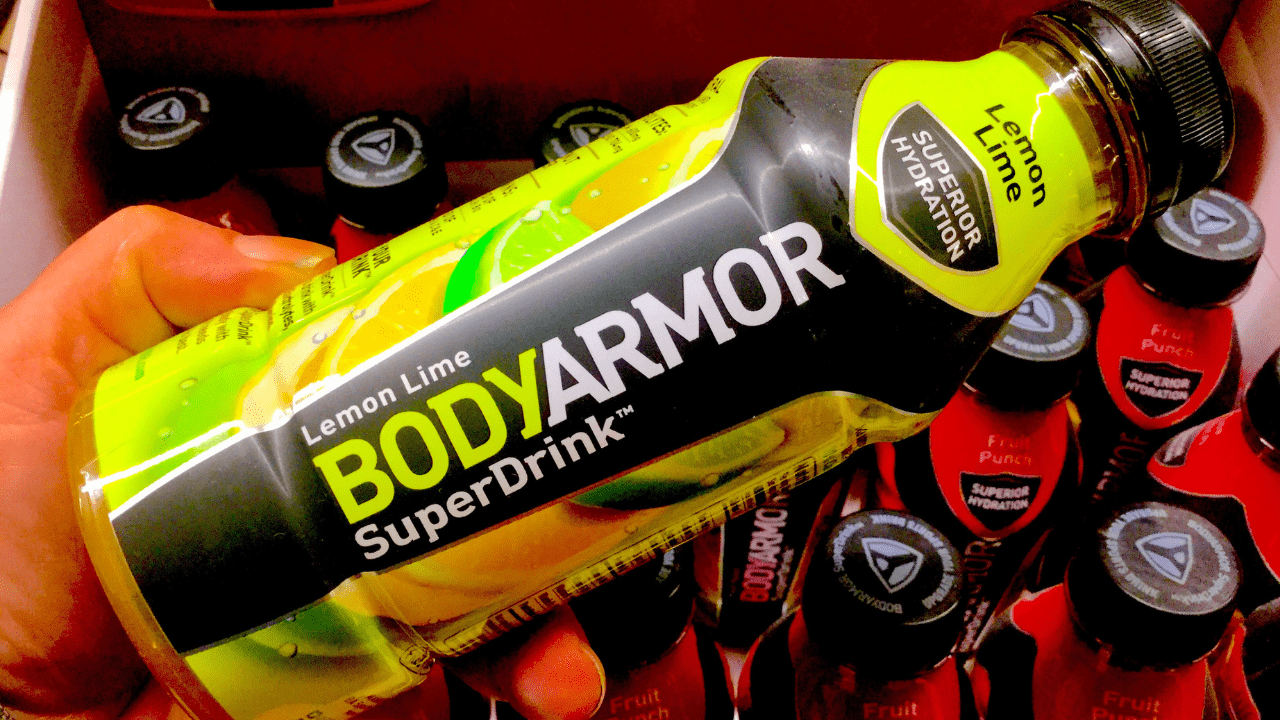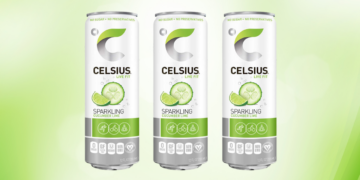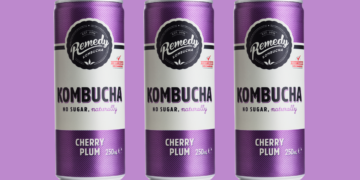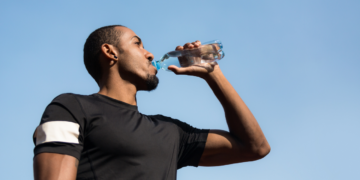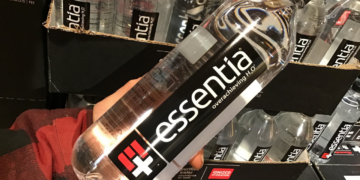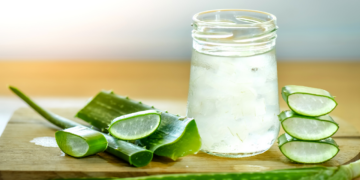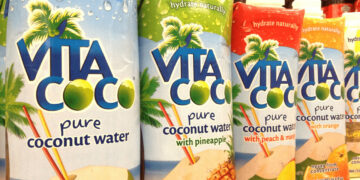Sports drinks are essential to have handy when participating in intense exercise as they replenish electrolytes in the body such as sodium, calcium, and potassium. There are many brands that flood the market and seemingly more are released every month. One such brand is Body Armor. Created by Mike Repole and launched in 2011, this brand exploded in sales in 2018 when Coca-Cola Company purchased a portion of the company and the UFC made the brand its official sports drink.
But is this the so-called healthy premium sports drink as touted?
Body Armor is a solid sports drink for moderate to extreme workouts. It contains a lower sodium content (20mg) than other sports drinks and is packed with a variety of vitamins. Although it has slightly more sugar (18g) than Gatorade(14g), this provides more readily available energy after a workout.
A Look At The Ingredients In Body Armor Drink
BodyArmor is a nice option if you want a sports drink that fits in with a certain nuanced lifestyle. It is certified kosher, vegan, soy-free, and gluten-free.
An 8oz serving of BodyArmor contains 70 calories, 20mg of sodium, 18 grams of carbohydrates, and 350mg of potassium. That same serving will provide:
- 50% of your recommended dietary intake (RDI) of Vitamins A, C, and E
- 100% of your RDI of Vitamins B3, B5, B6, B9, and B12
- 35% of your RDI of zinc
So far there are no particular red flags. But, let’s look at the ingredients a little further.
Pure Cane Sugar
To sweeten the drink, pure cane sugar is added. Cane sugar here could simply mean the regular sugar that is derived from sugar cane. Although health marketing would have you believe that cane sugar is somehow more superior to table sugar, this is not the case. All sugar is generally produced from either sugar cane or sugar beet. So, this is nothing special.
While sugar is generally demonized by the wellness industry, sugar is the most readily available form of energy. If you are using this beverage to fuel a workout, the instant boost in energy would be much welcomed.
The addition of pure cane sugar also indicates that it contains no artificial sweeteners—which usually come with their own set of side effects on prolonged use.
That said, you don’t want to consume too much cane sugar as it can lead to weight gain, obesity, and diabetes— if you are not working out as much.
Coconut Water Concentrate
A juice concentrate is a concentrated version of a fruit juice that is obtained by evaporating the water content of the juice. Concentrates are made for commercial reasons, as a juice void of most of its water content is easy to transport, store, and has a longer shelf life. Nutritionally, concentrated juice and fresh juice are fairly equal. However, the major differences lie in the fact that concentrate is often processed to include added sugar, preservatives, coloring agents, and other additives to increase shelf life and flavor. That said every company may have a different policy regarding how they produce their concentrate.
Nevertheless, the presence of coconut is a positive since it’s a natural source of sodium, potassium, and water; all of which form the basics of any sports drink. It also has natural sugars so there is no need to add too many added sugars.
However, it must be noted that coconut is listed as an allergen by the FDA. So, for some this immediately makes BodyArmor a non-starter. If you are allergic to other nuts— almond, cashew, walnuts— you may want to stay clear of coconut as well just to be safe. To be sure, visit your doctor for allergy testing. Until then, it’s best to avoid coconut if you are allergic to other nuts,
Added Vitamins
Body Armor contains vItamin A, C, and E; all of which are potent antioxidants. The presence of these vitamins is helpful as they help neutralize the free radicals produced due to oxidative stress during the workouts. This beverage also contains vitamin B (B3,5,6,9,12)— which helps in cell repair post-workout.
Electrolytes
BodyArmor contains a few replenishing electrolytes such as:
- Dipotassium phosphate: while potassium is useful for restoring electrolytes in the body, phosphorous plays a key role in adenosine triphosphate, which gives muscles energy.
- Magnesium oxide: an important macronutrient and electrolyte that contracts the muscles. It regulates blood glucose, the nervous system, and blood pressure.
- Zinc oxide: an electrolyte that keeps the immune system strong. Zinc also helps the muscles to recover after an intense workout, so you can benefit from more electrolytes and hydration.
The Sugar And Salt In BodyArmor Content.
An 8oz serving of BodyArmor contains 18 grams of sugar (36 grams of sugar in a 16oz bottle). This is slightly more than other sports drinks on the market, such as Gatorade which has approximately 14 grams per 8oz serving.
However, BodyArmor has less sodium than other sports drinks. With only 20mg, it comes in quite a bit lower than the 90mg you’ll find in Gatorade. While sodium is often used as an electrolyte in sports drinks, we get a lot of salt in our diets. By reducing sodium and using potassium instead, BodyArmor is still hydrating without the need for extra salt.
What BodyArmor Doesn’t Contain
- Artificial Colorants: BodyArmor doesn’t contain any artificial colors or food coloring. It gets its bright and bold colors from natural sources, such as vegetables, fruits, and vitamins like beta carotene. This is good as many coloring agents have a variety of side effects. Additionally, they can be contaminated with harmful substances that may induce hypersensitivity reactions.
- Artificial Sweeteners: This drink doesn’t contain any artificial sweeteners. Pure cane sugar is what gives it natural sweetness. Like the artificial coloring agents, artificial sweeteners are also controversial as they also have numerous side effects.
- Caffeine: If you’re caffeine sensitive, this drink is for you. It’s caffeine-free so it does not leave you even more dehydrated. You also won’t find caffeine in BodyArmor LYTE flavors. If however, you want caffeine, consider the BodyArmor Edge flavors as they contain 100mg of caffeine per 20.2oz bottle. Caffeine, as per some studies, increases performance during long, extreme workouts. But be careful, if your caffeine intake in a day is already high, you might skip the edge flavors. Remember, the safe limit of caffeine per day is less than 400 mg. Since BodyArmorEdge contains 100mg of caffeine per bottle, close monitoring of its intake is recommended.
Can Kids Consume BodyArmor?
It is not recommended for kids to drink Body Armor, or any other sports drink, even if they exercise and engage in sports regularly. For kids, electrolytes and hydration coming from food and water are enough. The electrolyte requirements for kids are different than adults. Therefore, giving kids sports drinks may cause an electrolyte imbalance as mainstream drinks are formulated based on adult recommendations.
Additionally, the NHS published recommendation states that adults shouldn’t have more than 30 grams of sugar per day, and children between the ages of seven and 10 shouldn’t consume more than 24 grams. For children between four to six, it is recommended to not consume more than 19 grams of sugar. A single 8oz serving of BodyArmor contains 18 grams of sugar, 99% of the entire day’s allocation of sugar.
What Are The Side Effects Of Consuming BodyArmor Sports Drink?
Consuming too many sports drinks especially BodyArmor isn’t a good idea as they are loaded with added sugars that sneakily increase your daily calorie count. You are already getting sugar from foods, why get more from your drink?
In addition, it’s worth noting that sports drinks contain ingredients to benefit people who engage in vigorous exercise for sessions that are an hour or longer. Adults need only consume sports drinks during heavy and extended exercise that lasts for more than an hour.
If you don’t work out regularly or heavily, you won’t benefit from drinking BodyArmor sports drinks in the same way athletes will. You’ll just be feeding your body unnecessary calories.
Coconut Water And Other Healthy Alternatives To Sports Drinks
There are some alternative drinks to consider if you want to boost your energy and electrolytes during exercise.
- Coconut water. It has a lovely taste, and it naturally contains all the important electrolytes that are usually present in a sports drink. They also contain natural sugar to serve you as an instant source of energy. Some studies say that coconut water is equally effective as a sports drink for providing hydration and improving performance in a 60-minute workout session. Therefore, coconut water could be a good option for moderate to short-duration extreme workouts.
- Water. Although sports drinks such as BodyArmor contain nutrients, plain old water is still the best to consume to stay hydrated. It has zero calories! What there not to love? Check out the article: 6 Natural Ways To Flavor Water & Leave Tastebuds Happy
- Cow’s milk. While it’s not vegan, drinking cow’s milk gives you potassium, sodium, and calcium. It’s a valuable blend of protein and carbohydrates to repair your muscles after physical activity. Read more about it in our article: What’s The Best Thing to Drink After a Workout?
Conclusion
A bottle of BodyArmor contains a balance of healthy ingredients and offers a delicious taste. It provides a low amount of salt and not too many calories while offering you nutrients to prevent an electrolyte imbalance. You’ll enjoy the range of BodyArmor flavors, such as fruit punch, strawberry banana, and other natural flavors without the concern of artificial food coloring or unnatural ingredients.
This premium sports drink is a good way to replenish your body if you lose significant electrolytes from excessive exercise. However, it shouldn’t be a complete substitute for good old-fashioned water.
That said, if you are not into exercising or playing sports for extended periods of time, we will suggest you skip this altogether.

